- Home
- Lou Cameron
Stringer and the Lost Tribe Page 13
Stringer and the Lost Tribe Read online
Page 13
It was hot, dusty going through chapparal and tanglewood under an afternoon sun on foot. Young Professor Robbins was getting all pink-faced and kept rubbing his neck with his kerchief. But he was game enough to keep up, and Stringer had to admire the dude. He was having his own time keeping up with Tim McCoy, who insisted on setting the pace and crashed through waist-high sticker-bush as if he thought he was a damned old elephant, even if he was only a moose.
When at last Joe Malliwah let himself be seen on a higher ridge ahead, Stringer started to explain. But the Indian agent said, “I know the rules. Let’s see if I can find an impressive boulder to hold court on.”
He could, and did. When Joe got tired of waiting for them to come on up and rode down instead, Stringer introduced him to the other white men and explained, “McCoy is the BIA agent we were hoping for, Joe.”
The Indian cowboy nodded dubiously and said, “Bueno. I’ll show you boys close to the band and see if the majapah wants to meet with you.”
McCoy said flatly, “I want to meet with him here. Tell him I’ll wait no more than halfway to sunset and that I’ll be very bitter in my heart if he refuses.”
Joe laughed incredulously. “You will, eh? Well, I’ll pass your suggestion along, but—”
“It’s not a suggestion. It’s an order,” snapped McCoy, who added, “And wipe that silly smirk off your face while you’re at it. MacKail here tells me you served in the Army one time. So did I. As a lieutenant colonel. Do we understand each other, Trooper Malliwah?”
Joe muttered, “Aw, shit.” He spun his pony around and rode off fast, not looking back.
Stringer raised an eyebrow. “Were you really a short colonel, Tim?”
McCoy replied with a frosty little smile, “As much a colonel as Buffalo Bill ever was. Indians understand military rank and respect it.”
Stringer sighed. “That’s what George Armstrong Custer seemed to think. We’re talking four handguns between the three of us, Tim. Don’t you think you ought to simmer down just a mite?”
McCoy shook his head. “You have to make them feel they’re talking to a real man. Real men don’t worry about dying, as long as they can die like men.”
Nat Robbins smiled weakly and asked, “Could I be excused for the rest of the afternoon, teacher?”
When McCoy failed to smile back, the Indian expert said, “I know a little about getting along with them too. This one’s sort of new to me. I generally start by handing out some calico and tobacco.”
McCoy said flatly, “I don’t. I offer them a square deal, take it or leave it. I treat them as responsible adults, not babies to be pacified with play-pretties.”
Stringer chuckled. “I thought the Square Deal was a notion of President Teddy Roosevelt.”
McCoy snapped back, “Who do you think I’m working for, the Tsar of All the Russians? The present administration inherited one God-awful tangle of past foolishness, some of it well-meant but most of it designed to line the pockets of both white and red political hacks The Indian policy of this country is an insult to common sense before you even consider simple justice. We have folks claiming to be one-sixteenth Indian collecting BIA handouts in one part of the country while full-bloods are dying of hunger and TB in other parts. Things can’t go on like this. Both a heap of Indians and all the taxpayers are being taken for a hayride.”
Nat Robbins smiled. “I take back what I’ve often said about everyone in the BIA, Tim. You’ll fail, of course, in the end. But meanwhile, do you mind if I set up shop here until they take your new reservation away from you? I’d like to get a handle on the Yana dialect before they all learn to beg for extra rations in bad English.”
McCoy sniffed. “It’s a free country, and this part of its reverts to federal open range as soon as that mining company abandons its mineral claim. But there’s not going to be any fool reservation here. I mean to enroll this band, whatever they may think they are, as Shasta or Maidu and move them to one reserve or the other. We can’t afford a separate Indian Agency for every separate family, can we?”
Stringer frowned. “You were just talking about offering the Yana a square deal, Tim. Is that what you call shoving ‘em off their home range to live with strangers who don’t even speak the same lingo?”
McCoy nodded. “It’s as square a deal as I can give them. No Yana nation exists on the books. I have to put them down as something, and as soon as I do, they become wards of the government and off-limits to duck hunters. We’ve tried bitty tracts set aside as reserves back east. Aside from being a bitch to administer, Indians surrounded by whites on a tiny plot of land tend to be exploited by their neighbors. They’re accused of raiding every chicken coop in the neighborhood, and some land-greedy county big shot is always out to get a so-called chief drunk enough to sign away such property as they still have. Until and unless they send some of their kids to law school, Indians are a lot better off on big reserves where their agent can keep an eye on white visitors, and a central trading post, licensed by the BIA, can keep them from being cheated blind.”
McCoy saw that Stringer still looked dubious. So he added, “Look, I know it’s not a perfect system, and Lord knows the Indians know it’s not a perfect system. But it’s that or extermination until and unless they learn to cope with our ways. President Roosevelt hopes they will, by the middle of this century. Look how the ex-slaves have learned to make their way in a white man’s country.”
Stringer said, “I have. Old Teddy always has been sort of an optimistic cuss.”
Before they could argue further, Joe Malliwah was back with the old majapah and some other sullen-looking Yana. Joe had made good time and obviously done some convincing talking.
The old majapah got right down to his brag, with Joe translating, and it sounded as if all Indian chiefs had attended the same elocution class, no matter which lingo they spoke. This one wound up by saying this land was his forever, that his eyes were crying blood, and wound up by tearing off his bear-claw necklace and throwing it on the ground as one of his wanasee shot an arrow into the same, between McCoy’s boots.
Without rising from his rock throne, the young Indian agent took off his ten-gallon hat, threw that on the ground, then shot it.
As everyone listened in stunned silence, McCoy told Joe, “I want to relay my words exactly. I’ll have no bull about a great white father. We’re talking about President Theodore Roosevelt, who speaks softly and carries a big stick. Nobody, ever, signed any damned treaty that mentioned running water or growing grass, outside a dime novel. No Yana, ever, signed any kind of treaty with anybody. So they have no legal status at all, nobody even knows how many of them there may be, and nobody, repeat nobody is going to do a thing if an unregistered band is wiped out by anyone they annoy in any way.”
He paused while Joe passed that on. The Indians didn’t like it at all, but their ears were still ringing, and they didn’t want the dawana saltu shooting his hat anymore. So the majapah just started to argue some more.
McCoy cut him off by drawing his six-gun again with a grim expression as he told Joe, “I don’t want to hear idle threats from a handful of dismounted troops. Tell him to forget what he may have heard about past BIA policy. Tell him that this agent also holds a reserve commission in the U.S. Army and that he can forget what he heard about us feeding them in the winter and fighting them in the summer. Tell him I want to be his friend, but that if he wants an enemy he’s talking to the right man.”
Joe translated, both ways, and the old majapah allowed he’d as soon be friends with such a big mean son of a bitch. They all knew that last remark had been Joe’s opinion. But McCoy nodded and said, “Bueno. Tell him that for now I want him and his band to stay well away from Quicksilver and their old valley. Tell him I understand the snow moons are coming and that he has my permission to go into winter quarters in these hills for now. Tell him that when the snow melts I intend to give everyone in his band a BIA number and that they have the choice of coming in for their allotments
as Shasta or Maidu because I’m such an easygoing gent.”
Joe said, “I’ll tell ’em. They won’t like it.”
McCoy said, “Then you’d best explain that I don’t have to be so easygoing. I have a cavalry column and a couple of mountain artillery pieces at my beck and call down in Fat Valley. Tell them the soldiers will herd the few survivors any damned place I want them to go, and that the Great Basin Desert is just made for bratty Diggers.”
Joe scowled and said, “You can just go to hell, white boy! These are human beings, not infernal livestock, damn your eyes!”
McCoy nodded and said soberly, “I just said I’d treat them as human beings if they’d let me. You’re a reservation Indian, if I read your outfit right. Have you been mistreated? Are you held prisoner by your agent, or am I guessing right about you being allowed to work off your reserve as a cowboy?”
Joe grumbled, “It’s different for these folk. They ain’t as educated as me and my folks.”
McCoy replied, “If you and your kin speak Yana, you went through the same educational process. I know you didn’t like it. The system stinks. But it’s the only one we have, and I see you’re still alive and well. I could tell you tales of Indians who insisted on doing things their way. But you’ve no doubt heard of Wounded Knee and the Washita. So what’s it going to be? Wiping out a nation is a lot cheaper than providing for ’em all the way down to their many-times greatgrandchildren, you know.”
Joe translated. More than once. The Yana pissed and moaned and went into a war dance that inspired both Stringer and Robbins to put thoughtful hands on their gun grips. But in the end Joe said grudgingly, “You win, providing this band gets to leave the reserve during the gathering moons if they can’t find all the acorns, bulbs, and toyon berries they need on the reserve. I told ‘em my reserve was best for them, even if the infernal agent does insist on calling ’em Shasta.”
McCoy said, “I can’t speak for the Shasta agent. Once I clear this matter up here, my job will be done. But I don’t see why any agent would want to keep well-behaved charges from leaving the reserve for good reason. He let’s you work off the reserve, doesn’t he?”
Before Joe could go into that in Yana, Stringer chimed in with, “The gathering’s about shot in that one valley anyway, Joe. A heap of oaks have been cut down, and some of the bulbs are bad eating. A white child died just a spell back, gathering bulbs in this band’s old stomping ground.”
Joe translated everything. The old majapah seemed as interested in the fate of little Mary-Jo Crocker as anything else. Joe said, “They don’t understand that. They had been gathering bulbs, good bulbs, for a long time over there. Even Yana children know what poison bulbs and roots smell like. They always get rid of them. There shouldn’t be any death camas in that valley.”
Stringer shrugged and said, “Seed must have blown in since they left, then.”
But Joe, being Yana himself, didn’t have to ask to say, “Hear me, any bulb big enough to eat has to be more than one summer old. Last summer, there were no saltu in that valley. Yana women and children worked those bulb fields over more than once. The saltu child died from eating something else.”
McCoy shifted impatiently on his rock and cut in to say it was his understanding they had an agreement and that all would go well if his Yana brothers behaved themselves. Then, when he got no argument, he said, “Bueno. I know the gathering has been poor this summer because of those white people. I’m going to send in a mule train of rations and some cough syrup for the kids. I’ll want your help in getting it to them, Malliwah.”
Joe nodded soberly and replied, “You got it. Just ask for me by name at my agency, this side of the first snows. Meanwhile, I mean to stay with this band, along with my guns, until I see how well you can get them mining men to behave.”
McCoy agreed, and they smoked on it before they split up. On the way back to town afoot, Stringer told McCoy, “That went well. But it just so happens an Army pal of mine told me the Army’s not about to march on anyone this late in the season, Tim.”
McCoy shrugged. “So what?”
“Just what were you planning on getting all those troops, then, with mountain artillery as well?”
McCoy didn’t answer.
Stringer laughed. “I predict a great future for you in motion pictures, once you lose your job as a decent Indian agent, Tim. For nobody but a born actor could have bluffed so brass-balled.”
McCoy smiled thinly. “A man works with what they give him to work with, and so far, the BIA has yet to give me all that much. They pay as much as five dollars a day down Hollywood way, too. Ain’t that a bitch?”
CHAPTER TEN
It was almost quitting time down in Quicksilver by the time the three of them trudged in, dusty and thirsty. The coffeepot in front of the Gore tents seemed far enough to walk for now. As Nancy sat them at a table and poured for them, she explained her father was in his tent, feeling poorly.
Nat Robbins raised an eyebrow and asked, “Don’t you mean sulking, honey? You were right about those Yana, you know. Some of the loan words they used sounded Shasta or Maidu, and ‘saltu,’ of course, is pure Ho or Uto-Aztec. Tim here keeps insisting they can’t be Yana anymore. He and your dad should get together on a paper. Meanwhile, how do you feel about doing a paper with me on their interesting dialect? They’ll still be around, at least until next spring. We could set up shop closer to them, in the hills, and—”
“I know where there’s an empty wowi,” Nancy cut in, not looking Stringer’s way as she quickly added, “Not that I’m about to spend a winter living in sin, Nat Robbins!”
The young professor grinned. “Just my luck. Maybe I’ll have to make an honest woman of you, Nancy. I know your father doesn’t approve of me, but you know we’d make a swell team.”
Stringer didn’t know how he felt about that, either. But he knew Nancy would have a red-faced time even talking about it with another man she’d had for breakfast listening. So he got to his feet with an elaborate yawn and said something about seeing how they were coming along with shutting down the mining operation.
He actually headed for the saloon, aboard his now well-rested pony. As he got there and dismounted to rest it some more while he had a beer, a shabby young mining man approached him.
The man coughed nervously and said, “I’d be Lem Crocker, the daddy of that little girl the Diggers dug up. I was wondering, seeing as you just come down from the hills, whether you’d noticed, say, a casket handle in your travels. My wife is mighty upset and—”
“We’re not sure your daughter’s grave was really opened,” Stringer cut in, feeling shitty as he added awkwardly, “It could have been just a dirty trick. Last time I was up yonder I noticed the grave markers were set sort of crooked. There hasn’t been any frost yet. It’s more likely someone moved ’em.”
Crocker blinked uncertainly and asked why anyone would want to do a thing like that.
Stringer said, “It’d be a lot less trouble than really digging all the way down. Someone was out to vex you. They had no real need for a little dead girl, no offense.
Say the pranksters just moved her headstone one notch over, to where nobody had ever been buried, they’d vex you just as good without half the trouble. I noticed the sod was sort of loose down the other way, where there’s no marker at all now. Do you follow my drift?”
Crocker’s eyes lit up with hope. “I sure aim to find out, as soon as I can find me a shovel!”
But Stringer suggested, “Dig at the far end, and quit when you hit wood where no coffin lies marked. That way you’ll know just as well, and your daughter’s remains can rest in peace. For all you’ll have to do is shift each marker one grave over, see?”
Crocker nodded soberly. “I do, and I thank you for the good thinking. I don’t mind saying I wasn’t looking forward to gazing on Mary-Jo’s remains again, no matter where they may be. She looked bad enough when we first put her to rest.”
Stringer frowned. “Do tell?
I heard she died of chawing death camas. It’s mean stuff, but I’ve never heard of it messing anyone up on the outside. They just tend to go to bed after a meal of what they took for fine onions and never seem to wake up again.”
Crocker shook his head. “It wasn’t like that with my daughter. She brung that one bad bulb in with some others she’d picked. Her mother was watching as Mary-Jo bit into it, turned red as a beet, and went into convulsions, with her poor little lips all blue and burnt. She died fast, but it wasn’t peaceable at all. The doc said there must have been prussic acid in that bulb. He says there’s prussic acid in bitter almonds and cherry pits as well. Whatever that bulb was, it must have had a heap of prussic acid in it.”
Stringer agreed. They shook on it, and he went into the saloon as the dead child’s father went to look for a shovel.
As he sipped his free beer, Stringer pondered the fate of the unfortunate child. He’d grown up in the same Sierra, eating lots of wild stuff and getting sick on some of it. But, unlike the late Mary-Jo, he’d been tipped off about the really deadly bulbs, roots, and berries before he’d ever managed to kill himself. Stringer considered all the tempting goodies he’d been warned to leave the hell alone, and he simply couldn’t come up with any species worse than death camas. He was sure that if there had been anything like a bulb that grew full of prussic acid, someone would have mentioned it to him and the other kids. Most white settlers were careful about stuff a kid could nibble on.
Prussic acid didn’t just grow wild in some bulbs, he knew. By its more scientific name it was known as cyanide, and to wind up with burns on her lips that little girl would have had to bite into the nasty stuff at full industrial strength.
He swallowed some beer and asked the barkeep if there was by any chance a photographer’s studio in Quicksilver. The barkeep looked blank and asked why he’d ask a dumb question like that.
Half to himself, Stringer said, “Photographers use some cyanide. But you’re right. It was a dumb question. I likely need the advice of a botanist instead of a detective. Nobody but a homicidal maniac would have any reason to poison kids with such stuff, even if they had it on hand.”

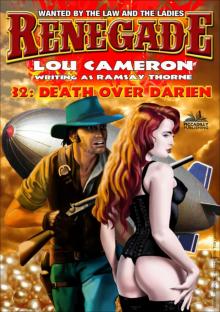 Renegade 32
Renegade 32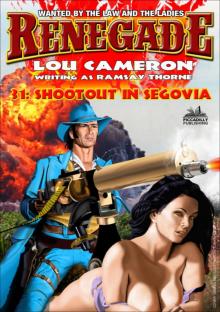 Renegade 31
Renegade 31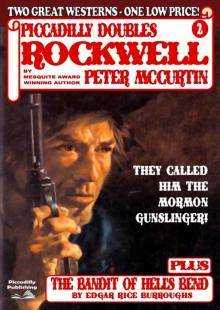 Piccadilly Doubles 2
Piccadilly Doubles 2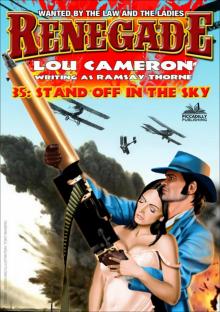 Renegade 35
Renegade 35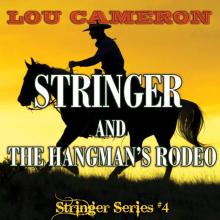 Stringer and the Hangman's Rodeo
Stringer and the Hangman's Rodeo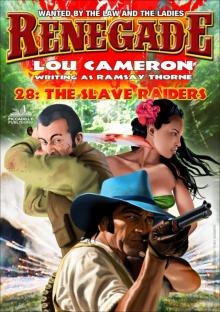 Renegade 28
Renegade 28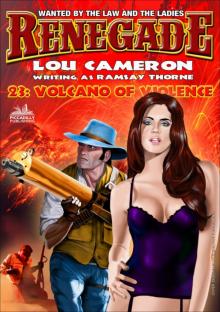 Renegade 23
Renegade 23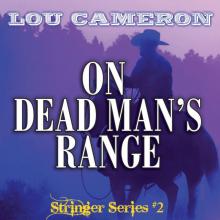 On Dead Man's Range
On Dead Man's Range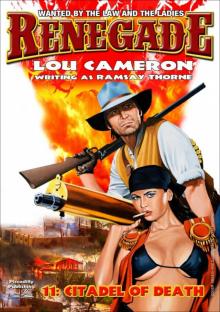 Citadel of Death (A Captain Gringo Western Book 11)
Citadel of Death (A Captain Gringo Western Book 11)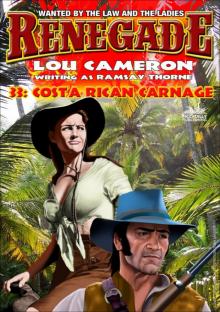 Renegade 33
Renegade 33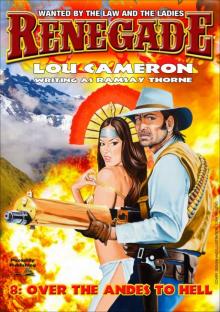 Over the Andes to Hell (A Captain Gringo Western Book 8)
Over the Andes to Hell (A Captain Gringo Western Book 8)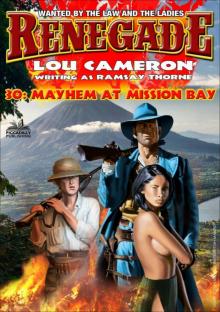 Renegade 30
Renegade 30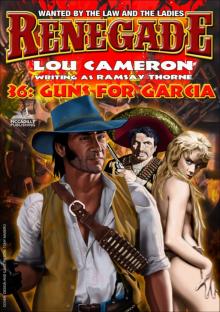 Renegade 36
Renegade 36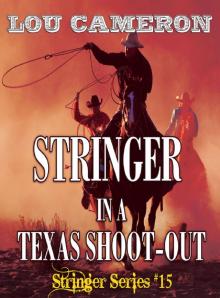 Stringer in a Texas Shoot-Out
Stringer in a Texas Shoot-Out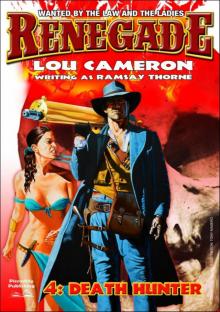 The Death Hunter
The Death Hunter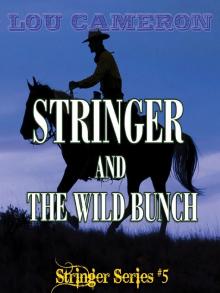 Stringer and the Wild Bunch
Stringer and the Wild Bunch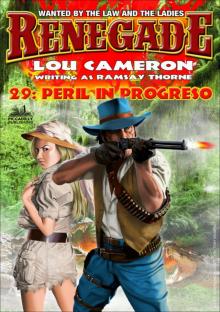 Renegade 29
Renegade 29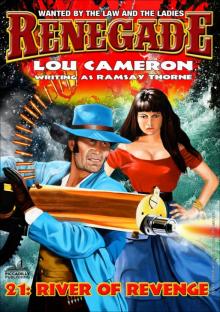 Renegade 21
Renegade 21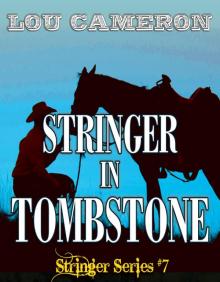 Stringer in Tombstone
Stringer in Tombstone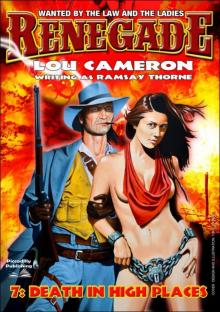 Death in High Places (A Renegade Western Book 7)
Death in High Places (A Renegade Western Book 7)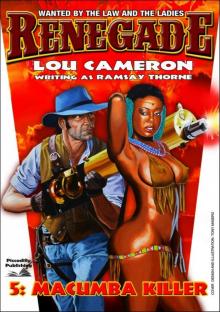 Macumba Killer
Macumba Killer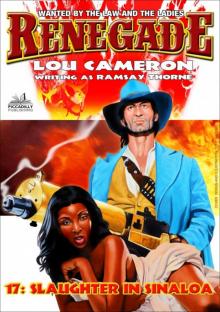 Renegade 17
Renegade 17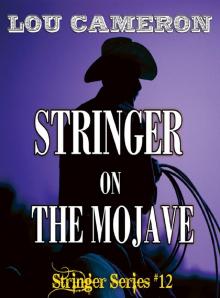 Stringer on the Mojave
Stringer on the Mojave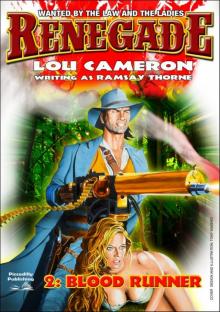 Blood Runner
Blood Runner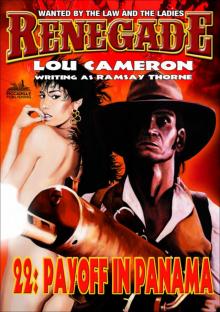 Renegade 22
Renegade 22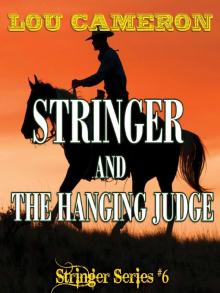 Stringer and the Hanging Judge
Stringer and the Hanging Judge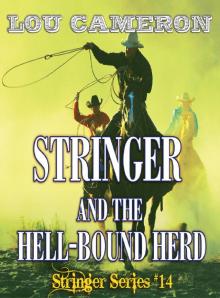 Stringer and the Hell-Bound Herd
Stringer and the Hell-Bound Herd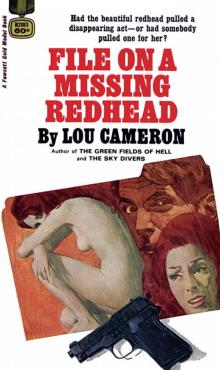 File on a Missing Redhead
File on a Missing Redhead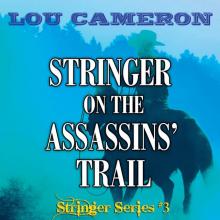 Stringer on the Assassins' Trail
Stringer on the Assassins' Trail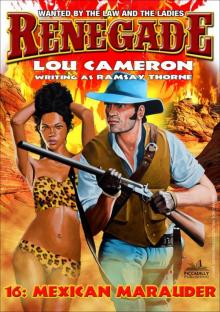 Mexican Marauder (A Captain Gringo Adventure #16)
Mexican Marauder (A Captain Gringo Adventure #16)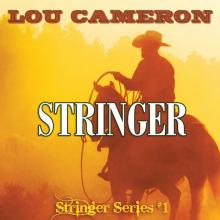 Stringer
Stringer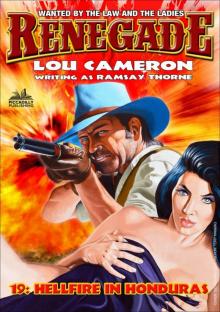 Renegade 19
Renegade 19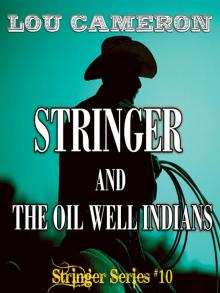 Stringer and the Oil Well Indians
Stringer and the Oil Well Indians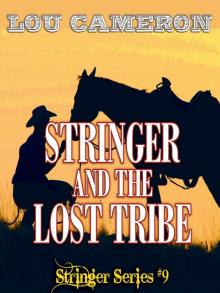 Stringer and the Lost Tribe
Stringer and the Lost Tribe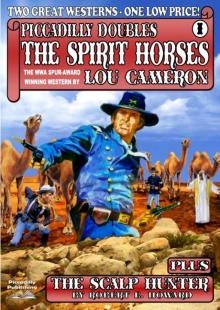 Piccadilly Doubles 1
Piccadilly Doubles 1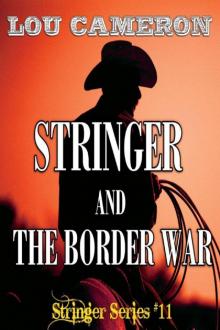 Stringer and the Border War
Stringer and the Border War Renegade
Renegade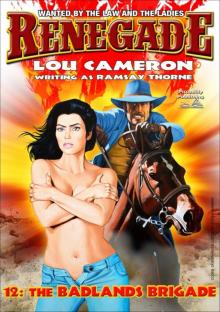 The Badlands Brigade (A Captain Gringo Adventure Book 12)
The Badlands Brigade (A Captain Gringo Adventure Book 12)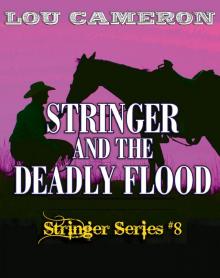 Stringer and the Deadly Flood
Stringer and the Deadly Flood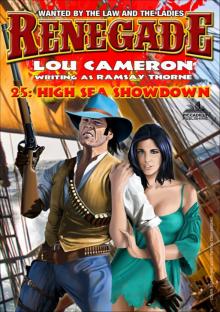 Renegade 25
Renegade 25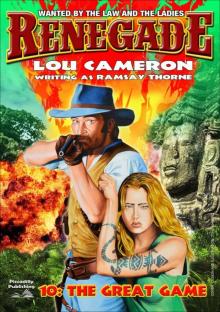 The Great Game (A Captain Gringo Western Book 10)
The Great Game (A Captain Gringo Western Book 10)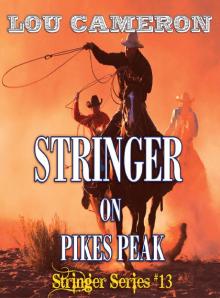 Stringer on Pikes Peak
Stringer on Pikes Peak